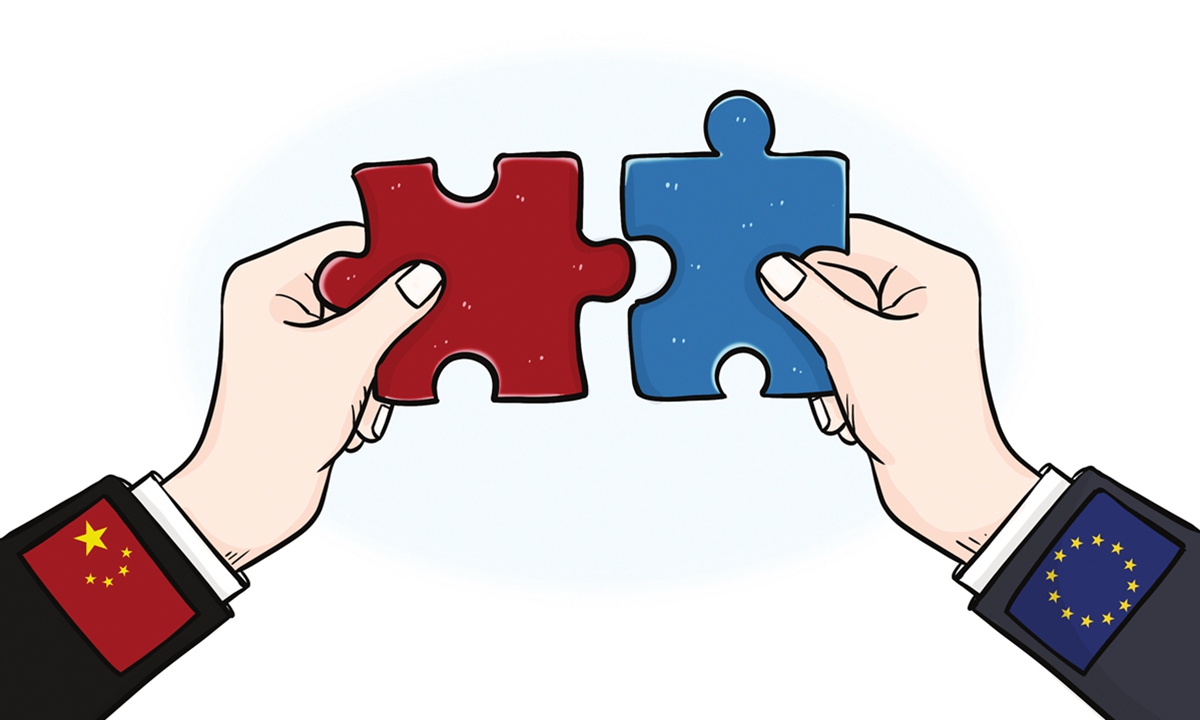Establishing diplomatic ties with China puts France at the forefront of history: French entrepreneur

The Hall of Prayer for Good Harvests at the Temple of Heaven, Beijing (left) and Louvre Museum, Paris Photos: VCG
Editor's Note:
In 1964, against the backdrop of the Cold War, General de Gaulle made the historic decision to establish diplomatic relations with the People's Republic of China (PRC), making France the first major Western power to do so. As a result of this decision, France was, not only on the right side of history, but at the forefront of history, 15 years ahead of the Americans, Arnaud Bertrand (Bertrand), a French entrepreneur and commentator on economics and geopolitics, told Global Times (GT) reporter Li Aixin in a recent interview. Bertrand quoted former French foreign minister Hubert Vedrine, stating that France has been pursuing the goal of making the world of tomorrow composed of several poles, and the growing power of China could enable France and Europe as a whole to emerge as an independent pole.
GT: How do you evaluate the 60-year-old China-France relationship? What do you think have been the highlights and achievements of this relationship?
Bertrand: France's foreign policy under de Gaulle was characterized by a very deep attachment to French sovereignty, meaning France's ability to make its own decisions according to its own national interests. This is how France's decision to establish diplomatic relations with the People's Republic of China should be seen.
At the time, de Gaulle said, "China is a gigantic thing. It is there. To live as if it did not exist is to be blind, especially since it exists more and more."
He knew that China couldn't be ignored and he knew that if France was the first Western country to recognize China, it will not only, again, be on the right side of history, but it will be at the forefront of history. He knew that this would benefit France for its future relations with China, because there can only be one Western country that was the first to establish diplomatic relations with China. Thanks to him that country will forever be France, which grants France a special place in China's history.
In terms of the highlights in our relationship, French companies have benefited a lot from the Chinese market, and China has benefited from French technology as well. For instance, EDF (Électricité de France), the French electricity company, helped China build a nuclear power plant in Taishan, Guangdong Province. France's luxury sector benefits hugely from the Chinese market. It's fair to say it's been a productive relationship between our two countries.
GT: President Xi Jinping is visiting France and there have been frequent high-level interactions between China and France. What signals do you think such interactions send to the outside world?
Bertrand: Both China and France see benefits in these interactions. France can demonstrate that it still has credibility as an independent voice on the world stage, and it is still a power worth engaging with. China can show that the West is not a unified bloc when it comes to siding with the US against China.
I will apply the famous sentence that nations have no permanent friends or allies, they only have permanent interests. I think that most countries in the West actually do not want a US-China confrontation, because for most of them, it is against their interests.
Former French foreign minister Hubert Védrine once said that "the entire foreign policy of France … is aimed at making the world of tomorrow composed of several poles, not just one," because it's totally against France's interest to be under the thumb of the US, which could then basically impose whatever agenda it wants on France.
This was 25 years ago. Since then, France is back in NATO and colonized in many ways by the US. Although China did emerge as an alternative power to the US, France didn't quite succeed at not putting itself under the thumb of the US, which is somewhat ironic. But the spirit is still somewhat part of France's diplomatic DNA. I hope that someday, it will translate again into France managing to assert itself as a sovereign country.
The growing power of China should enable it to do that, because if played right, it could enable France and Europe as a whole to emerge as an independent pole.
I like a quote from The Lord of the Rings. In the movie, there are three rings of power. Why? Because "one ring [possessing all the power] will always corrupt, two will divide. But with three, there is balance." Right now, we're in a division between the US and China. In some ways, there are only two rings in the world order. France and Europe have an opportunity to emerge as a third ring to bring balance. They should take that opportunity.

Arnaud Bertrand Photo: Courtesy of Bertrand
GT: From President Macron's China visit to Xi's trip to Europe, how do you interpret the significance?
Bertrand: It's exactly my The Lord of the Rings quote. China understands well that Europe can play a balancing role between the US and China to avoid conflict. I think basically China is telling Europeans - Go on, be independent, and play the balancing role.
Ukraine will be a big topic during Xi's visit to Europe. One of the reasons why China is an interlocutor for Europe with regard to Ukraine is that China is the only major power that can negotiate to bring about an end to the war, because China has remained a credible interlocutor to both sides.
It's a bit disingenuous for Europe to complain about China's relationship with Russia, as, most likely, that's where the best chance of salvation comes from. China's relationship with Russia is no different than all the countries in the Global South, which make up about 80 percent of the countries on Earth. The global exception, the isolated power, is the West, not China. Why would China start to isolate itself from the rest of the world to stand together with the West, or to start becoming hostile to their biggest neighbor, Russia, with the knowledge that the US' primary objective, even more than defeating Russia, is to contain China? Why would China literally hand the US a stick to beat them with? It's completely unrealistic.
GT: As you understand it, what is the true attitude of the French people on the South China Sea issue?
Bertrand: The general point of view of the French population is more and more similar to the official American narrative, sadly. It's part of the sovereignty problem that was mentioned earlier. We should have our own independent viewpoints on important issues, not be a parrot that repeats talking points from the other side of the Atlantic. If we keep doing this, it means our voice simply doesn't matter anymore.
The South China Sea issue is something that should be solved with negotiations to ensure that everyone's aspirations are satisfied to some extent. China and ASEAN are doing it - They're trying to negotiate a code of conduct.
China's main concern in the South China Sea, I think, is related to national security. They don't want it to be a playground for the US military right on their border, which is understandable. And other countries' aspirations are different, more related to fears with regard to trade, fishing rights, and things like that.
I think a compromise could ultimately be made whereby the Americans are out, and all countries in the region retain rights with regard to trade, exploitation of resources, fishing rights, and so on and so forth, something that could, in some ways, satisfy everyone, except the Americans, which is why you see them being so vocal against it. That's why they're agitating the Philippines.
GT: Do you think France will become further involved in the South China Sea issue?
Bertrand: That's a good question. I don't know. I don't think we have many resources to dedicate to this, especially with the Ukraine war going on. We already don't have resources for the Ukraine war. It's a bit mad to expect us to have resources for an issue at the other end of the planet.

